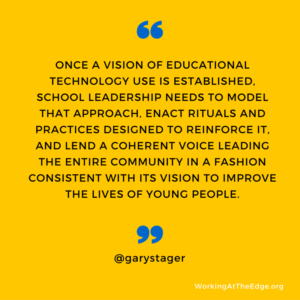 In recent posts I’ve written about the importance of vision and the need for leaders to anchor conversations around technology use in that vision. After the most recent post, Gary Stager shared an article he wrote titled Outside the Skinner Box: Can Education Technology Make a Course Correction?
In recent posts I’ve written about the importance of vision and the need for leaders to anchor conversations around technology use in that vision. After the most recent post, Gary Stager shared an article he wrote titled Outside the Skinner Box: Can Education Technology Make a Course Correction?
The article is a “must read” and rich in ideas and classroom vignettes. What struck me most were the parts related to vision, leadership and professional development. These excerpts helped strengthened my thinking and prompted me to develop a series of How might… questions I will use in my practice. The questions are easily transferred to any leadership context, so I hope others will use and modify them – maybe even share out some new ones. Below are the questions paired with each excerpt from Stager’s article.
- How might learning with technology look different if we asked principals and teachers to think about who is granted agency by the hardware and software in our classrooms/systems? What would we learn? How might we lead when learner agency is least impacted?
In schools, all hardware and software bestow agency on one of three parties: the system, the teacher, or the learner. Typically, two of these actors lose their power as the technology benefits the third. Ask a group of colleagues to create a three-column table and brainstorm the hardware or software in your school and who is granted agency by each. Management software, school-wide grade-book programs, integrated learning systems, school-to-home communication packages, massive open online courses (MOOCs), and other cost-cutting technologies grant maximum benefit to the system. Interactive whiteboards, worksheet generators, projectors, whole-class simulations, plagiarism software, and so on, benefit the teacher. Personal laptops, programming languages, creativity software, cameras, MIDI keyboards, microcontrollers, fabrication equipment, and personal web space primarily benefit (bestow agency to) the learner.
- How might learning with technology look different if every educator (teachers and leaders) held a bold but fluid vision for learning with technology?
Schools need a bolder concept of what computing can mean in the creative and intellectual development of young people. Such a vision must be consistent with the educational ideals of a school. In far too many cases, technology is used in ways contrary to the stated mission of the school. At no point should technology be used as a substitute for competent educators or to narrow educational experiences. The vision should not be rigid, but needs to embrace the serendipitous discoveries and emerging technologies that expand the power of our goals.
- How might learning with technology look different if every school and school system had a leader that promoted the vision and removed barriers to its enactment?
Once a vision of educational technology use is established, school leadership needs to model that approach, enact rituals and practices designed to reinforce it, and lend a coherent voice leading the entire community in a fashion consistent with its vision to improve the lives of young people. Great leaders recognize the forces that water down innovation and enact safeguards to minimize such inertia
- How might learning with technology look different if our professional learning reflected the vision for learning in the classroom?
You cannot be expected to teach 21st-century learners if you have not learned in this century. Professional development strategies need to focus on creating the sorts of rich constructive learning experiences schools desire for students, not on using computers to perform clerical tasks. We must refrain from purchasing “teacher-proof” curricula or technology and then acting surprised when teachers fail to embrace it. PD needs to stop rewarding helplessness and embrace the competence of educators.
Together, these are powerful questions that can transform systems. Be sure to read Stager’s article and discover vignettes of these ideas in practice. As leaders, we then need to ask, Why not in my school/district?
What big questions are you asking about the use of technology for learning?
Connect with Randy on Twitter and on the TLTalkRadio podcast!
Get new content delivered to your inbox and the ebook 3 Key Principles of Digital Transformation. The ebook contains valuable information from my experience leading a digital transformation and working with a variety of stakeholders over the past decade.
- A silver lining - January 22, 2022
- Is our use of tech working against us? 🤔 - September 8, 2021
- What’s NOT going to change in the next 10 years? 🤔 - September 7, 2021
As somebody who has been teaching the same way for the last 15 years it is hard to change. The part about the professional development really hit home. Change is hard, especially since the way I have been teaching was the way I was taught to teach and the way I was taught.
Thank you for this.